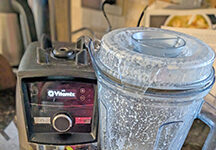Amanda Miller
Columnist
Lettuce Eat Local
It was obvious there was something very fishy going on. It was back during that first fall of Covid, and I had initially thought my blinding headache and body pains were just another lovely effect of pregnancy. I was literally in the middle of cutting an onion, though, when my sense of smell disappeared — poof!
It was oddly disorienting to slowly come to the realization that I could no longer smell that sharp allium pungency, almost like the sudden change down to four senses put my body into an alternate dimension. I brought the other half of the onion up to my face, and while my eyes still burned, my nose had no messages for me.
I needed no further confirmation of the situation, but a few nights later, I put my non-functioning olfactory organs to one of the strongest tests I could imagine: fish sauce. I do a lot of baking and cooking, and we live on a dairy farm, so there were constantly chances for me to realize it if my sense of smell had decided to return. But those seemed like at least somewhat nebulous tests; some foods just don’t have strong aromas, and while it’s horrifyingly obvious to many visitors, by now my nostrils are quite accustomed to the lingering dairy air (“the smell of money,” according to some; just poo to the rest of us).
[Spoiler: my nose did get back to working, as evidenced by the fact that I ironically had to stop right there upon catching a different kind of “money” whiff as my daughter crawled onto me.]
But even stronger than 400 adjacent cows and more evocative than freshly baked bread is the smell, and I do mean smell, of fish sauce. If you’re not familiar with this Southeast Asian umami bomb, the name gives it away: it is sauce made from fish. However, as one bon appétit article put it, “you don’t just smack a fish around and out plops a bottle of fish sauce.” There is a lot of fermentation, perhaps years of it, that needs to happen before anchovies and salt in barrels turn into that funky, savory, incomparable liquid some of us know and love.
It’s that something-something that takes especially Thai dishes up to the next level, but it’s certainly not an ingredient you overdo or consume on its own. Long-fermented fish juices sounds terrible — and might smell even worse.
Unless, of course, you can’t smell, which I confirmed beyond a shadow of doubt that pad thai night when I brought my face down to the bowl of rice vinegar, brown sugar, and an epic amount of fish sauce. I breathed in deeply, or as deeply as my still-scared-of-the-smell lungs could allow, and caught nary even a trace of fishiness. You might think that was a blessing in disguise in this instance, but no smell means essentially no taste either, so it was very disappointing all around.
But, as aforementioned, my sense of smell did return after about two months. My sorrow, however, over missing that fish saucy pad thai lingers, much like the aroma of fish sauce will if you ever spill it anywhere. So if you want something that smells a little fishy, but not quite so pungently, try my “fish sauce” recipe — no fermenting barrels required.
Sauce for Fish
Though real fish sauce’s ingredient list is simple (anchovies, salt, maybe water and sugar), it is certainly not a simple process and I do not ever intend to even consider making my own. That said, a homemade remoulade-style sauce for fish is so much better than bottled tartar sauce. This one comes together in seconds and has just the right balance of creamy, tangy, and briny.
½ cup mayo
½ cup plain yogurt
2 tablespoons capers, chopped, with a little splash of brine
½ tablespoon paprika
½ – 1 tablespoon prepared horseradish
Creole seasoning (I use Tony Chachere’s), to taste
splash of lemon juice
bit of hot sauce/cayenne, to taste
Stir together all ingredients; taste and adjust if necessary. Serve chilled with lots of versions of fish, from fried catfish to baked trout to tuna salad, and even the occasional steamed, raw, or slaw-ed vegetable.



